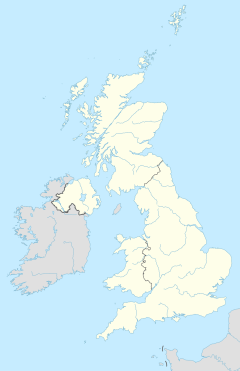Saltney
| Saltney | |
|---|---|
 Saltney High Street | |
Location within the United Kingdom | |
| Population | 5,452 (2020 Estimate) |
| OS grid reference | SJ375645 |
| Principal area | |
| Unitary authority | |
| Preserved county | |
| Ceremonial county | |
| Region | |
| Country | England & Wales |
| Sovereign state | United Kingdom |
| Post town | CHESTER |
| Postcode district | CH4 |
| Dialling code | 01244 |
| UK Parliament |
|
| Senedd Cymru – Welsh Parliament |
|
| Website | saltneytowncouncil.gov.uk/ (Wales) |
Saltney is a town straddling the counties of Flintshire and Cheshire on the England–Wales border. The local government community of Saltney lies entirely in Wales, while the English areas are unparished. The town forms part of Chester's built-up area[1] and is around 5 miles from Deeside.
Saltney is located next to the River Dee. In the 2001 census the population of the town was 4,769,[2] rising to 5,132 at the time of the 2011 census.[3]
Location
[edit]Higher Saltney, known locally as "Top Saltney" is in Chester, Cheshire. The Welsh sector of the community is known as Saltney,[4] and is known as "Saltney" in Welsh as well.[5] The England–Wales border runs down the middle of Boundary Lane, the only urban street in England and Wales where this happens.[6] Houses on the west side of the street are in the Flintshire County Council area and in the North Wales Police jurisdiction, while those on the east side are in the Cheshire West and Chester unitary authority area and in the Cheshire Police jurisdiction.[6] in terms of policing, this refers to operations jurisdiction not legal jurisdiction. Officers from both forces have full legal jurisdiction throughout England & Wales therefore the border is largely immaterial for practical purposes. The west side is in the Alyn and Deeside parliamentary constituency and the east is in the City of Chester electoral division.
History
[edit]Saltney's name is derived from the former salt marshes by the River Dee on which it is built. Once the terminus of Sir John Glynne's Canal, Saltney grew in the late nineteenth century and through the twentieth century to its present population of over 5,000. Saltney Ferry railway station was open between 1891 and 1962.
Morfa Caer is an old Welsh name for the area.[7]
Saltney was a location for shipbuilding and in particular chain-making and the manufacture of anchors. The firm Henry Wood & Company was first to establish an engineering works on the west bank of the Dee in 1847, with further industrial development continuing into the 1880s.[8][9] Henry Wood's legacy is implemented with Wood Memorial CP School being named after him.
Amenities
[edit]There is a public house called The City Arms in Higher Saltney. Other amenities in Saltney include the Corner Pin public house, a post office, Saltney Business Centre, St David's Retail Park and the Asda and Morrisons supermarkets.
Saltney has three primary schools, St Anthony's Catholic Primary, Saltney Ferry C.P. and Wood Memorial. St David's High School is the local secondary school for students from the surrounding areas.
The Anglican parish church is St Mark's which is in Higher Saltney. On the High Street can be found St Anthony of Padua Catholic Church and Saltney Methodist Church.
There is a community centre in the centre of Saltney which is regularly used by children's groups as well as being surrounded by fields where football tournaments are often held. The Community Centre is also home to Saltney Town FC who formed in 2010.
Notable people
[edit]- Stephen Dewar Holden (1870–1918), engineer, locomotive superintendent of the Great Eastern Railway, 1908-1912.
- Charles Sitch (1887–1960,) politician and MP for Kingswinford, 1918-1931.
- Arthur Pearson (1897–1980), politician and MP for Pontypridd, 1938-1970
- Ted Regan (1900 – ??), footballer with 188 caps with Wrexham A.F.C.
- Melanie Roberts (born 1988), retired artistic gymnast.
See also
[edit]- St Matthew's Church, Saltney
- Sealand, Flintshire, a nearby area of farmland reclaimed from the Dee estuary.
- Chester Corporation Tramways former tramway to Chester station
References
[edit]- ^ UK Census (2011). "Local Area Report – Chester built up area (K05000008)". Nomis. Office for National Statistics. Retrieved 25 August 2021.
- ^ UK Census (2001). "Local Area Report – Saltney Parish (Community) (00NJ028)". Nomis. Office for National Statistics. Retrieved 2 February 2021.
- ^ UK Census (2011). "Local Area Report – Saltney Parish (Community) (W04000206)". Nomis. Office for National Statistics. Retrieved 2 February 2021.
- ^ "Lache Park (Ward Profile)" (PDF). Chester City Council. Archived from the original (PDF) on 10 November 2008. Retrieved 30 November 2007.
- ^ "Standardised Welsh Place names". www.welshlanguagecommissioner.wales. Retrieved 30 April 2023.
- ^ a b The One Show, BBC TV, 6 August 2009
- ^ The History of North Wales: Comprising a Topographical Description of the Several Counties of Anglesey, Caernarvon, Denbigh, Flint, Merioneth, and Montgomery. To which is Prefixed, A Review of the History of Britain, from the Roman Period to the Saxon Heptarchy. Interspersed with Notes Biographical and Explanatory. J. Gleave and sons. 1828. p. 220.
- ^ Roger Swift, ed. (1996). Victorian Chester: Essays in Social History, 1830-1900. Liverpool University Press. p. 26. ISBN 0-85323-661-5. Retrieved 13 March 2020.
- ^ C P Lewis, A T Thacker, ed. (2003). "Late Georgian and Victorian Chester 1762-1914: The economy, 1841-70, reorientation and boom". A History of the County of Chester: Volume 5 Part 1, the City of Chester: General History and Topography. British History Online. pp. 177–185. Retrieved 2 February 2021.



